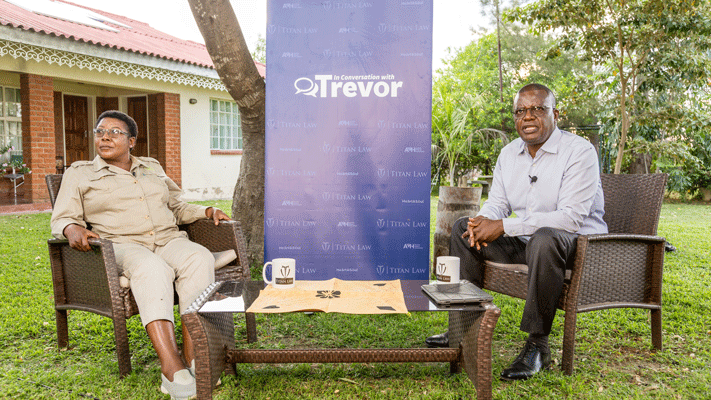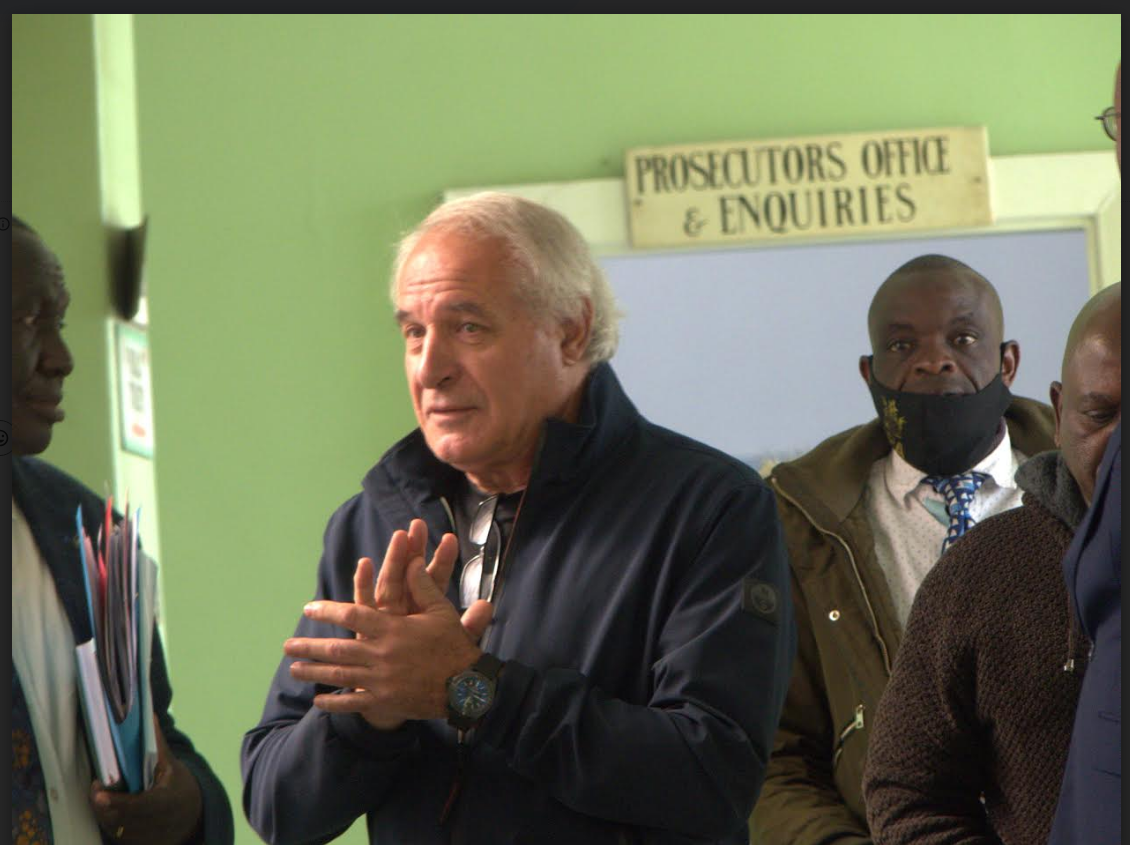
Prominent businesswoman Divine Simbi Ndhlukula says growing up in a rural area and having a father who believed in equal opportunities for girls and boys, prepared her for the male-dominated security services sector. Ndhlukula, the MD of Securico and Zvikomborero Farms told Alpha Media Holdings chairman Trevor Ncube on the show In Conversation with Trevor that her late father taught her the importance of hard work and that gender was not an impediment to success. She also spoke about how she set up her thriving security services and farming enterprises.
DN: Thank you Trevor, we are indeed honoured for you guys to come over here. TN: You were so generous to take us around the farm to see the various projects you have around here, we will get into that later. We would also like to talk about Securico, which is the security company that you started that is now one of the biggest security companies in Zimbabwe. There is a lot to talk about. Let’s start by taking you to Gutu where you were born and raised and looking at what is around us here to be so far away from Gutu. Just take us briefly into what it was like being born and raised in Gutu.
DN: Growing up in Gutu made me who I am today. I grew up in a family that believed in the culture of working hard to be where you want to be. I went to school in the rural area, but certainly I was in a better position because my parents were business people. But we had friends that we went to school with. I grew up in an environment where I saw deprivation. My parents taught me that whoever you see in life at whatever level — relationships are very important and this is the foundation that I always try to cultivate in my kids. My father believed in me. He was one of the people, who was well ahead of his time. In the 70s he wanted all of us to be who we wanted to be even if you were a girl or a boy. At the time the ambitions particularly from the parents for the girl child were different from that of the boys. They looked up to the girl to find a decent man to get married to and set up a home and so on. My father used to encourage me to be ambitious because I was straight a ‘A’ student and each time I came home after the term, we were given positions and I would always come up number 1. He told me never to lose that position “in your life wherever you are going to be, at whatever age you will be”. He told me that I was a winner.
TN: You said that when you were growing up you had big dreams, and you were very clear about what it is that you wanted to become. Are you living your dream? DN: Yes, I am certainly living my dream. My father told me that I could be whatever I wanted to be and in my mind I knew what I wanted to be. One thing I knew I wanted to do was to own my own means of production. I knew I wanted to be in business. I told peers in school that I was not going to be working for anyone for long and that it was not going to be a small business. I was very clear about that position. I simply knew where I wanted to go.
TN: What came first for you, Zvikomborero or Securico? DN: I started with Zvikomborero, Securico came after. I have been farming for the past 28 years.
TN: What drew you into farming? Is it because your dad was into farming or it was something from within Divine? DN: I had a deep passion for farming. Even growing up I loved planting trees. Farming is something that was there deep inside, but to end up farming here at Zvikomborero was more by default because it was bought by my father. When he died my brother inherited the farm and I had to eventually rescue the situation when the farm was being foreclosed because my brother had gotten into some debts using the title deeds of the farm. However, I could have been farming anywhere had I not been here. Farming is something I would have done even without farming by default here at Zvikomborero.
TN: We took a tour earlier on and you showed us a lot of things that you are doing on the farm and I am asking you now the benefits of what we saw on the tour. Outline the breeds that you have. DN: Trevor we do cross breeding with indigenous goats. The breeding of goats is a new thing in Zimbabwe and we are happy to be a part of the people that have championed that because it’s an area in Zimbabwe with a lot of scope because there is a demand for goats in the Arab world, even here and Africa. We are working with smallholder farmers in goat breeding because most people cannot afford to have cattle because they are a lot more expensive to look after. A lot of farmers in the rural areas lost their cattle because of lack of dipping services whereas with goats in the rural areas any farmer can look after and make a decent livelihood for that matter. We have worked with more than 14 non-governmental organisations in the last two years and that has transformed the lives of smallholder farmers in places such a Gokwe, Shurugwi, Mutoko, Buhera. Goat production in Zimbabwe is a game-changer even for big commercial farmers.
TN: I saw cattle that I have never seen on your farm, take us through the breeds that you have and why you are doing what you are doing. DN: Because of climate change we decided to work with the local breed that we call the African breed. We breed the Boran, a Kenyan breed. We start breeding with a Tuli, it’s a Zimbabwean breed but it has spread worldwide. We also work with the Mashona and do start breeding with Texas Mashona. We are working with those three breeds, but we also have a commercial herd, which is a mixture of all sorts. We need to supplement them because they are breeds that are not too huge. We can supplement them without using too much money. We have done well at the Zimbabwe National Breed Sale, we have been selling our bulls there and we have people coming to look at what they can get from us in terms of breeding stock. We will be launching an online store. Currently we have a few customers buying from us from all over the world even in the diaspora, buying for their families out here and that is a model that we think is going to be the future.
- Chamisa under fire over US$120K donation
- Mavhunga puts DeMbare into Chibuku quarterfinals
- Pension funds bet on Cabora Bassa oilfields
- Councils defy govt fire tender directive
Keep Reading
TN: Let’s go now to your other business, Securico. How did you start this business and why did you start this business? DN: Securico is a business that I started after I had tried other businesses. I was working and whenever I would enter a building the first people I met were guards. I could see that they did not have the necessary confidence that a security guard needed when you talk to somebody at his work station. They had very low self-esteem. So as an entrepreneur I could see that there was an opportunity. I yearned to see confident guards like in foreign countries. So I saw the gap of quality orientation because guards are the gate-keepers of any company. So I jumped into the sector. I was very convinced that the security business was a game-changer. I had learnt a lot of lessons before. So I started on the drawing board seeing what it took and what I would do differently. How was I going to deliver quality services?
TN: That takes a lot of confidence Divine because you were getting into a sector where there are big firms, who have been operating for 40 to 50 years. That takes a lot of confidence. DN: Yes, it does take a lot of confidence, which I believe my father had instilled within me and I believe attitude is that little extra that takes you a long way. My attitude is always positive I have got to say that whatever I am going to do will succeed. Self-belief is important so I knew the security business was going to be a game-changer. Even those close to me tried to discourage me and say that I couldn’t succeed since I was a woman. But that didn’t put me down. I employed a guy who helped me to create a strategy to make the company work. So he asked me who my competition was and I told him that our competition was the work that we wanted and he said, Okay. But I knew that the work was what I was going to get.










